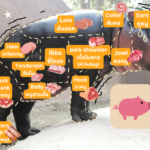| 琴 | - (きん) (n) qin (7-stringed Chinese zither); guqin [EDICT]
- (こと(P);そう(箏;筝)) (n) (1) koto (13-stringed Japanese zither); (2) (こと only) (arch) stringed instrument; (3) (箏, 筝 only) zheng (Chinese zither); guzheng; (P) [EDICT]
- (qín, ㄑㄧㄣˊ) guqin or zither, cf 古琴; musical instrument in general [CE-DICT]
|
| を | - () (prt) (arch) (See を) marks object of action, etc. (also adds emphasis) [EDICT]
|
| 弾く | - (はじく) (v5k,vt) (1) (uk) to flip; to snap; to flick; (2) (uk) to repel; (3) (uk) to use (an abacus); to calculate; (4) (uk) to strum; to pluck the strings (of a guitar, etc.); (P) [EDICT]
- (ひく) (v5k) to play (piano, guitar); (P) [EDICT]
|
| た | - () (aux-adj) (1) (after the -masu stem of a verb) want to ... do something; would like to ...; (prt) (2) (kyu [EDICT]
- () (exp) (abbr of ...ていたの) (See 乃・の・5,わ) (usu. sentence end) indicates emotion, admiration, emphasis, etc. [EDICT]
- () (aux-v) (after a noun, usu. as 〜たる者, etc.) (See たり,たるや) (those) who are; (that) which is; often used in relation to qualifications and requirements for a position; in the capacity of [EDICT]
- () (suf) (m-sl) (fam) (fem) (See ちゃん) (cute) suffix for familiar person [EDICT]
- (他) (n-adv,n,adj-no) other (esp. people and abstract matters); (P) [EDICT]
- (多) (n,pref) multi-; (P) [EDICT]
- (田) (n) rice field; (P) [EDICT]
|
| って | - () (prt) (abbr for というのは and other similar combinations) casual quoting particle; (P) [EDICT]
- () (prt) (1) indicates emotional closeness or annoyance with someone; (2) indicates an indirect command by expressing annoyance (in sentence-final position) [EDICT]
|
| 誰 | - (だれ) ใคร [LongdoJP]
- (だれ(P);たれ(ok);た(ok)) (pn,adj-no) who; (P) [EDICT]
- (shéi, ㄕㄟˊ) who; also pronounced shui2 [CE-DICT]
- (Shuí, ㄕㄨㄟˊ) variant pronunciation of shei2, who; surname Shui [CE-DICT]
|
| が | - () (prt) (positive sentence end) I dare say; (negative sentence end) though, honestly [EDICT]
- () (suf,v5r) (1) to feel (on adj-stem to represent a third party's apparent emotion); (2) to behave as if one were [EDICT]
- () (n) scree [EDICT]
- () (adv-to) (1) (on-mim) thump; thud (dull sound representing something being hit); (2) severe; difficult; hard [EDICT]
- (我) (n) (1) {Buddh} obstinacy; (2) atman; the self; the ego [EDICT]
- (画) (n) picture; drawing; painting; sketch [EDICT]
- (蛾) (n) moth [EDICT]
- (賀) (n) (See 賀の祝) congratulation [EDICT]
- (雅) (n,adj-na) (1) (ant [EDICT]
|
| 聞く | - (きく) (v5k,vt) (1) to hear; (2) (usu. 聴く) to listen (e.g. to music); (3) (formal 聴く) to ask; to enquire; to query; (P) [EDICT]
|
| て | - () (conj) (col) (See と言うか) or rather (say); or better (say); or perhaps I should say; or, how should I put it,...; I mean [EDICT]
- () (prt) a sort of thing like; used after a phrase to modify the following noun [EDICT]
- () (prt) (1) (also でも, っても) even if; even though; (int) (2) (abbr) (See さても) wow [EDICT]
- (手) (n) (1) (occ. pronounced た when a prefix) (See お手・おて・1) hand; arm; (2) (col) (See お手・おて・3) forepaw; foreleg; (3) handle; (4) hand; worker; help; (5) trouble; care; effort; (6) means; way; trick; move; technique; workmanship; (7) hand; handwriting; (8) kind; type; sort; (9) (See 手に入る) one's hands; one's possession; (10) (See 手に余る) ability to cope; (11) hand (of cards); (12) (See 山の手・1) direction; (P) [EDICT]
|
| くれる | - (呉れる) (v1,vt) (uk) (くれ is an irregular alternative imperative form) to give; to let one have; to do for one; to be given; (P) [EDICT]
- (暮れる) (v1,vi) to get dark; to end; to come to an end; to close; to run out; (P) [EDICT]
- (眩れる) (v1,vi) to get dark; to end; to come to an end; to close; to run out; (P) [EDICT]
- (暗れる) (v1,vi) to get dark; to end; to come to an end; to close; to run out; (P) [EDICT]
|
| ん | - () (prt) that being the case; because of ...; the reason is ....; given that...; (P) [EDICT]
- () (exp) the expectation is that ...; the reason is that ...; the fact is that ...; it is that ...; (P) [EDICT]
|
| だ | - () (prt) (1) (as …たり…たり, after the ren'youkei forms of multiple verbs) -ing and -ing (e.g. "coming and going"); (2) (used adverbially) doing such things as...; (3) (as …たり…たり at sentence-end, after the ren'youkei forms of a repeated verb) expresses a command; (aux-v) (4) (たり only) (arch) (from とあり) (See たる) (after a noun) to be; (5) (たり only) (arch) (from 〜てあり, after the ren'youkei form of a verb) indicates completion or continuation of an action; (P) [EDICT]
- () (prt) (1) (fam) marks wh-question (what, where, who); (2) (chn) strengthens one's judgment or conclusion; (P) [EDICT]
- () (exp) if it's the case; (P) [EDICT]
- () (prt) even [EDICT]
- () (suf,prt) and; or; and the like; and so forth; and what not; (P) [EDICT]
- () (exp) (1) (See でしょう) seems; I think; I guess; I wonder; I hope; (2) don't you agree?; I thought you'd say that!; (P) [EDICT]
- () (n) (col) (abbr) (See 友達) friend [EDICT]
- () (n) undercut (of a machined edge) [EDICT]
- (駄) (pref) (1) (See 駄文・1) poor; low-grade; trivial; insignificant; worthless; (n-suf,ctr) (2) (See 一駄) load; pack; horse load; (n) (3) packhorse [EDICT]
- (兌) (n) dui (one of the trigrams of the I Ching [EDICT]
|







